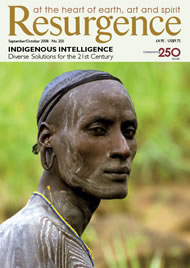THE INJUSTICE OF Western immigration policy came to light last spring when hundreds of illegal African workers in France went on strike. They were fed up. For years, they’d been losing a quarter of their salaries to health insurance, pension funds and other programmes – which they couldn’t access. Last spring, backed by France’s largest trade union, they stopped work and demanded legal status.
Their frustration is understandable. Undocumented workers are the backbone of the French economy. They do the essential jobs that are disdained by many – in hotels and restaurants, as farm labourers and house-cleaners.
This incident highlights the double standards written into the immigration laws in Europe, where borders are selectively open to citizens of the European Union, but not to residents of places like Turkey or the African continent. Doctors and computer programmers are generally welcome, but not bus drivers or seamstresses. Newcomers are expected to integrate seamlessly into the society, even as they’re subject to harsh restrictions. They have little or no access to benefits like free health care, and no right to vote.
Rinku Sen raises these contradictions in The Accidental American: Immigration and Citizenship in the Age of Globalization. Sen is president and executive director of the Applied Research Center (ARC) in New York, an organisation formed to advocate for racial equality. She suggests the desire to settle in places where economic wealth creates employment is natural and shouldn’t be punished, but instead rewarded with a path to citizenship.
Sen’s book isn’t the first in recent times to advocate rewriting our immigration laws. They Take Our Jobs! And 20 Other Myths about Immigration, authored by American history professor Aviva Chomsky and published last year, is a well-researched and systematic argument in favour of citizenship for illegal immigrants. Even more convincing is British publicist Philippe Legrain’s Immigrants: Your Country Needs Them, also published in 2007. In it, Legrain argues that open migration could spread freedom, enrich the economies, societies and cultures of both developed and less-developed nations and increase employment for all.
Instead of focusing on facts and arguments as these other books do, Sen approaches the debate through the story of Fekkak Mamdouh. Mamdouh was twenty-seven when he left Morocco for the United States in 1988. He had a degree in physics but started out, like so many illegal immigrants, in a restaurant. His first job was delivering orders around town, and then he worked as a busboy, but he quickly became a waiter. He experienced little discrimination and did not need to fear the police as he had done in Saudi Arabia, where he’d worked previously.
But Mamdouh isn’t a typical migrant. He served customers at Windows of the World atop New York’s World Trade Center, at the time the country’s most profitable restaurant. Employees there worked hard, earned good salaries and were even allowed to set up a trade union.
Then, on September 11, 2001, two planes flew into the building. Not only were seventy-three of Mamdouh’s co-workers killed, but the immigration debate took a 180-degree turn. The year before, US President George W. Bush, then Governor of Texas, had said, “Immigration is not a problem to be solved; it is the sign of a successful nation. New Americans are to be welcomed as neighbours and not to be feared as strangers.” The terrorist attacks, however, led to the persecution of immigrants, illegal or not, resulting in further limits on their rights as citizens and employees along with stricter surveillance of the Mexican border. The same backlash occurred in Europe, where people were anxiously looking for the good old days when problems weren’t global, but more manageable.
Sen describes how the immigration policy changed following the terrorist attack. In the aftermath, for example, the way millions of dollars in compensation was distributed among victims’ families raised uncomfortable questions. “Should the children of firefighters get less or more than those of stockholders?” Sen writes. “What about those of the dishwashers, janitors and deliverymen? Should the children of undocumented immigrants get anything at all?”
Sen also shows how Mamdouh played a pioneering role in setting up the Restaurants Opportunities Center of New York, an organisation founded to exact better working conditions for restaurant employees. The organisation helped finance Colors, a Manhattan restaurant owned by its employees, from the dishwashers to the head chef, many of them former Windows on the World staffers. The Accidental American therefore also reads like the history of a daring experiment in entrepreneurial spirit.
Since April, the striking African labourers in France have been getting work permits on a case-by-case basis. Their employers couldn’t operate without them, despite the country’s high unemployment rate; many have even joined in the fight to secure their employees’ legal status. That way lies our most promising future, believes Sen, quoting the motto of a Moroccan human rights group: “Globalisation has to be for everything, humans as well as goods.”








